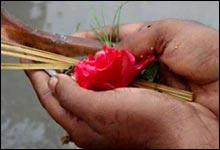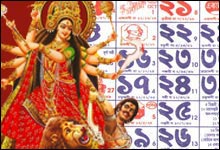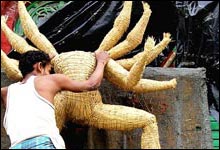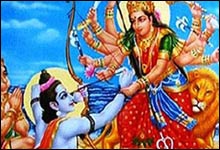THE MYTHOLOGY OF GODDESS DURGA

Durga Puja, the festival of Bengalis is the worship of 'Shakti' or the divine power. Most of the religious celebrations in the world have legends surrounding them.The fables are generally the fight between the evil and the good, the dark forces eventually succumbing to the divine.Worship of Goddess Durga is based on myths where Durga symbolizes the divine power.
ACCORDING TO THE INDIAN MYTHOLOGY
Mahishasura, the king of Asuras, through years of austerities, was once granted a boon by Lord Bramha, that no man or deity would be able to kill him. The immense power filled in him the urge to rule over the world. He started to terrorize heaven and the inhabitants. He pervaded the world with his battalion of Asuras and plundered and ruthlessly killed the people. Chaos and anarchy reigned. Gods were driven from heaven and Mahishasura usurped the throne.The Gods scared and unable to combat him, requested Lord Shiva, Lord Bramha and Lord Vishnu to stop Mahishasura's tyranny. In answer, the three Gods combined their divine energy and summoned up a feminine form so brilliantly glaring that it illuminated the heavens. This combined power fell on the residence of Sage Kattyana in the krishna chaturdashi (fourteenth day of new moon) in the month of Ashwin (September-October).From the glow emerged Devi Durga, a beautiful yellow woman with ten arms riding a lion.
Despite her grace she bore a menacing expression, for Durga was born to kill. Fully grown and armed by the gods, beautiful Durga was named "Kattyani" as she is born in the ashram of sage Kattyana. The sage worshipped her for suklasaptami, asthami and nabami tithi then on the tithi of Dashami she killed Masishasura. She was sent forth against Mahishasura armed by symbols of divine power; Vishnu's discus; Shiva's trident; Varuna's conchshell; Agni's flaming dart; Vayu's bow; Surya's quiver and arrow; Yama's iron rod; Indra's thunderbolt; Kubera's club and a garland of snakes from Shesha and a lion as a charger from Himalayas. A fierce battle took place.

Finally when Mahishasura in the guise of a buffalo charged against Durga, the Devi beheaded the buffalo and from it emerged Mahishasura in his original form. Durga pierced his chest with the trident and relieved the world from the evil power. That is why she is 'Durgatinashini Durga', our mother goddess who destroys the evil, protects her devotees and establishes peace and prosperity on earth.We worship Durga as the mother goddess, the epitome of 'Shakti' (divine power), to deliver us from the evil and bring peace and prosperity in our lives. But the most interesting part of Durga Puja is that, instead of placing Durga on a high alter and worshipping her from a distance the Bengalis embrace her in their hearts and make her an inseparable member of the family. Goddess Durga is welcomed to the earth as our daughter who annually visits her parents' home. Durga stays for four days-Sashti, Saptami, Ashtami and Nabami along with her children, Ganesha, Laxmi, Kartik and Saraswati and sets for her husband's abode on Vijaya Dashami. Durga's mode of journey to the earth is detailed in scriptures. The modes, an elephant, a horse, palanquin, boat all signify luck or omen which influence the life on earth. The elephant signifies prosperity and good harvest while journey on a horse back indicates drought, a palanquin spells wide spread epidemic and the boat suggests flood and misery. The worship of Devi Durga in the month of October however owes its origin to Krittibas Ojha's "Ramayana". Sree Rama hastily worships Durga,the goddess of 'Shakti', just before he sets for Lanka to rescue Sita from Ravana. According to Puranas, King Suratha, used to worship the goddess Durga in spring. Thus Durga Puja was also known as Basanti Puja. But Rama prepones the Puja and worships the Devi in autumn and that is why it is known as 'Akal Bodhon' or untimely worship. Over the years, this Akal Bodhon has become the tradition among Bengalis and in Bengal.



